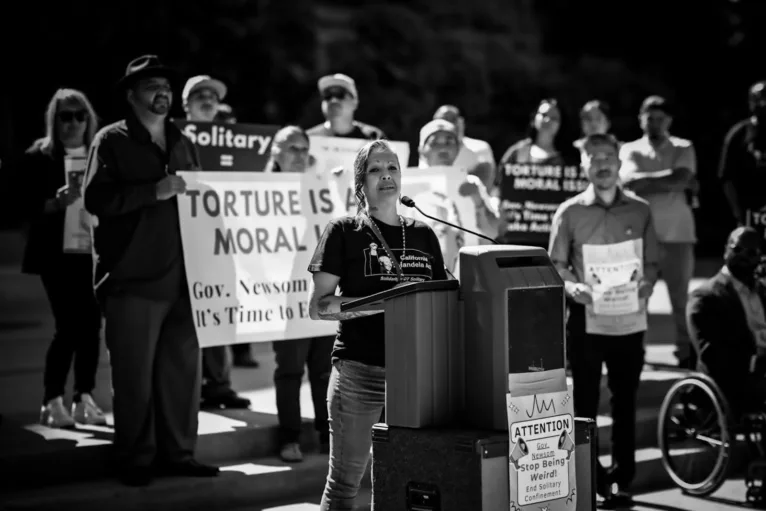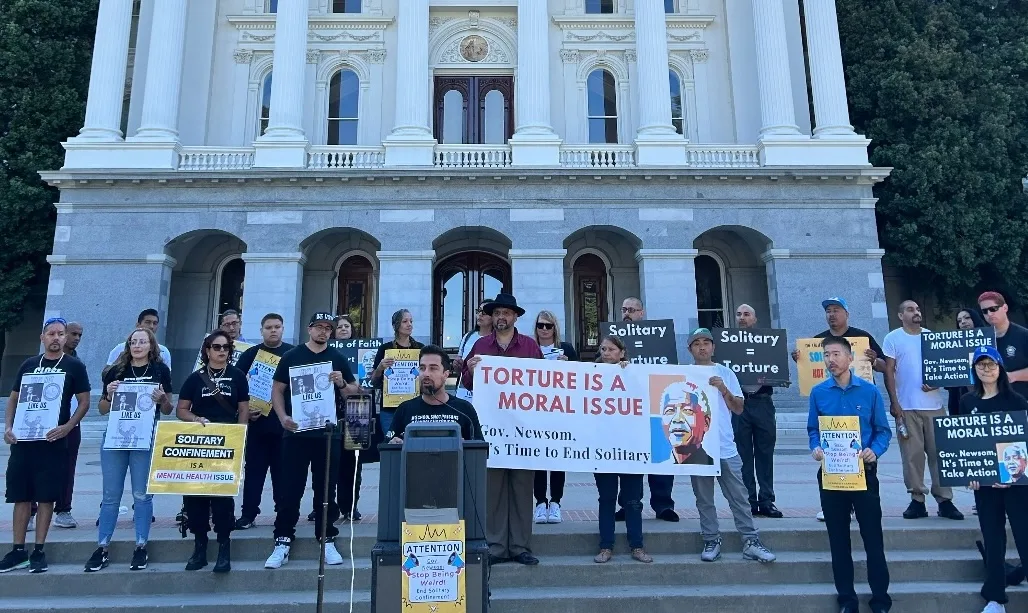Advocates Blast Gavin Newsom for Fighting Solitary Confinement Reform
Formerly incarcerated Californians say that if Gavin Newsom wants to keep touting his record as a “progressive,” he should stop vetoing bills that ban or restrict solitary confinement.

On August 19, Jessica Solis stood outside the California State Capitol building before dozens of people. The crowd was trying to get Governor Gavin Newsom’s attention. Speaking into a microphone on the lawn outside his office, she expressed agony that she had been in and out of solitary confinement from age 13 until she was 42. She called on the governor to take action.
“Solitary confinement is designed to break you—it’s designed to make you go crazy,” Solis said. “It’s designed to kill you. Because the majority of the people there killed themselves because they can’t handle it. If you want to make a change, Governor Newsom, then you can stop this torture that’s still going on every single day.”
Solis is part of the California Mandela Campaign, a coalition of immigration rights, disability rights, and criminal justice advocates organizing to end solitary confinement in California since 2020. The fight to end the practice has been going on for decades. But the efforts have hit multiple roadblocks—including Newsom.
California’s solitary confinement practices currently do not meet UN recommendations. Even though most California voters support curtailing the practice, Newsom has blocked recent legislative efforts to address the issue. As of October 31, nearly 3,000 people sat in the California Department of Corrections and Rehabilitation’s (CDCR’s) restricted housing units.
Other states, such as New York, Nevada, and Connecticut, have passed solitary restrictions similar to what California’s advocates have proposed. Over the last two years, the state introduced two bills called the “California Mandela Act,” which would have restricted solitary confinement to no more than 15 consecutive days or 20 out of 60 days. Those regulations would have brought the state into accordance with the United Nations’ “Nelson Mandela” rules, a set of international benchmarks for prison conditions. Newsom vetoed one bill. Lawmakers halted another bill earlier this year after Newsom stated he would not sign any legislation on solitary confinement.
Internal correspondence from July shows that Brady Borcherding, Newsom’s deputy legislative affairs secretary, told advocates that “after much internal conversation,” Newsom “isn’t comfortable making further changes to [solitary confinement] policy this year.”
In the days since Kamala Harris’s 2024 election defeat, some commentators have suggested that Newsom ought to become the party’s next leader. Though Newsom purports himself to be a “progressive” on criminal-legal issues—regularly touting his plans to turn San Quentin State Prison into a “rehabilitation center,” for example—those on the left have assailed his record on homelessness, policing, and mental illness as draconian and cruel. Anti-solitary advocates, for instance, say Newsom has shown no support or willingness to negotiate with them.
But activists continue encouraging him to take action by holding campaigns, forums, and rallies. They are calling for regulations that ban the use of solitary confinement against pregnant people, individuals with certain disabilities, and anyone younger than 26 or older than 59.
In response to a request for comment, a spokesperson for Newsom’s office directed The Appeal to the statement the governor released after his aforementioned veto.

Though Newsom acknowledged that the state is “ripe for reform” in his veto statement, he said the bill was “overly broad” and “could risk the safety of both the staff and incarcerated population within these facilities.” Instead, he directed the CDCR “to develop regulations that would restrict the use of segregated confinement except in limited situations.” The move came after the California Correctional Peace Officers Association, the union representing prison guards, donated $1.75 million to Newsom’s recall campaign.
“His conduct has never been acting in good faith with respect to this issue, to the advocates working on it, and to the model that other states have provided,” said Hamid Yazdan Panah, co-executive director of the nonprofit group Immigrant Defense Advocates.
Morris said that Newsom’s decision to give CDCR discretion over solitary confinement regulations seemed like Newsom didn’t “want to ruffle the feathers of a California correctional officers union that is 1000s of people strong with an abundance of money.”
Morris added that Newsom “should have intervened. Because to say, ‘I’m going to allow the California Department of Corrections and Rehabilitation to make the right decision’ is absolutely lunacy. For him to make that statement, it was a cop-out.”
Even without legislation, Yazdan Panah said Newsom can utilize his oversight of CDCR to restrict solitary confinement. He called Newsom’s inaction on solitary confinement hypocritical since the governor is willing to spend millions to close death row and remodel San Quentin.
“He was saying that death row doesn’t work, and it’s as costly and all these things, but the same things are true about solitary confinement,” said Yazdan Panah.
Solitary issues aren’t the only prison-related measures Newsom has vetoed, despite his progressive promises. He has also shut down legislation that would have let more pregnant women and mothers in prison live in off-site facilities with their newborns, as well as legislation that would have banned CDCR from transferring parolees to ICE.
“What is not acceptable is to publicly say one thing and then privately do something else,” said Yazdan Panah.
California Mandela Campaign advocates are also working to end solitary confinement in the state’s private immigration detention centers. Detainees at the Mesa Verde and Golden State Annex immigration detention facilities have held hunger strikes to protest the use of solitary confinement.
“Governor Newsom is allowing a corporation from Florida, which he talks so much smack about, put people in solitary confinement and torture them here,” said Edwin Carmona-Cruz, co-executive director of the California Collaborative for Immigrant Justice.

Standing in front of the crowd, Solis told Newsom that “solitary confinement is designed to break you” and said Newsom needs to “stop this torture.”
During her time in solitary confinement, Solis remembers she would sing to drown out the noise of other women crying and screaming in the units. She remembers having to stick her hand out of the cell—roughly the size of a parking spot—to get her meals. She was escorted, handcuffed, to the shower. Solis says she developed anxiety from being separated from others and claustrophobia from spending months in the small space.
During her time in solitary confinement, Solis said that three women died. One mother serving 16 months told Solis she was looking forward to going home to her son— but ended up dying by suicide. Not long after that happened, Solis said another woman died because she had a seizure, choked on her own vomit, and no one came to check on her.
“I have a lot of friends that are still suffering in there,” she told the crowd, “and it makes me feel like I’m doing something for them to stop this from happening to the next person.”
Solitary confinement often leaves individuals more traumatized than when they went in. When Jamala Taylor left solitary confinement after 15 years, he told The Appeal he was so accustomed to being alone that social settings made him anxious. Taylor recalled that he would sit alone in his cell with the light off because that was familiar to him. All the outside noise would overwhelm him.
“Socialization is something I lost,” Taylor said. “I never thought I could or would, but when I got in the situation around people, I was thoroughly overwhelmed.”
In an interview, Jack Morris said he spent more than 30 years in solitary confinement. To escape his environment, he said he would spend his time writing, working on legal cases, and reading everything from the migration patterns of the peregrine falcon to “The Dancing Wu Li Masters.”
“When your imagination starts to become the only reality you have, you start to play tricks on you,” Morris said. He added: “Your mind starts to tell you you’re going to go crazy, and then you start to see other people do the same thing. So it becomes a mental struggle.”
While Newsom’s office said it would not sign solitary confinement legislation, activists refuse to back down. Solis said that she still gets messages from women on the inside who feel hopeless and beg for help. She’s also a registered substance-use disorder counselor and speaks at events to raise awareness about the effects of solitary confinement.
“We need to be treated like humans,” Solis said. “We need to stop the torture because we’re the ones that are coming home, and we’re going to be part of this society, and all these groups together, we supported each other so that we’re not throwaways like they thought we were.”
